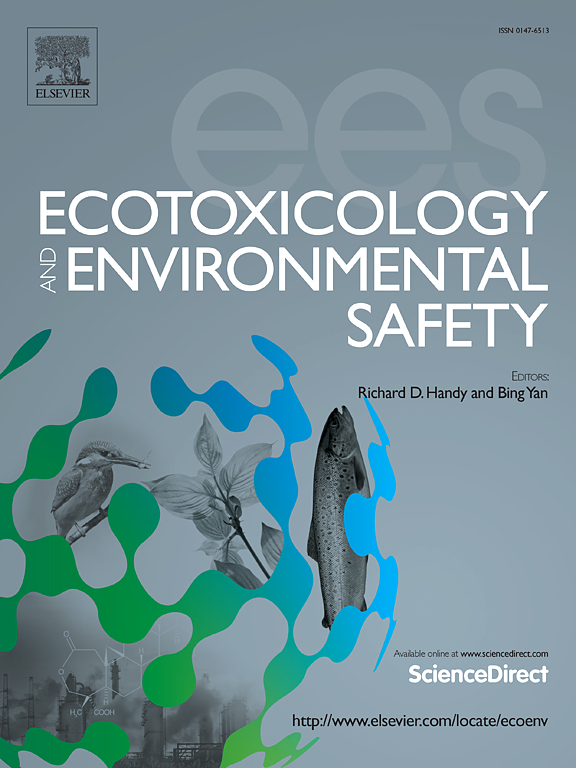在粪肥堆肥过程中抗生素抗性基因的动态和缓解:一个全面的综述
IF 6.1
2区 环境科学与生态学
Q1 ENVIRONMENTAL SCIENCES
引用次数: 0
摘要
抗生素耐药基因(ARGs)的全球传播对公众健康构成重大威胁,这是由于在畜牧业生产中广泛使用抗生素以及随后通过动物粪便在环境中传播ARGs造成的。粪肥堆肥已成为一种广泛采用的粪肥管理和减少病原体的策略;然而,它在减轻arg方面的有效性仍然是可变的,并且取决于特定的条件。本文综述了目前对粪便堆肥过程中ARG命运的认识和理解,重点介绍了温度、pH、碳氮比、曝气和水分含量等关键因素对ARG动态的影响。它进一步探讨了微生物群落转移、水平基因转移和可移动遗传元素在ARG持续和衰减中的作用,以及最近在堆肥技术方面取得的进展,如超嗜热堆肥、生物炭改性、电动和磁场辅助堆肥以及微生物接种,这些技术在缓解ARG方面显示出了希望。包括在堆肥后期阶段ARG再次出现的可能性以及缺乏标准化的评估方案。最后,它确定了关键的研究差距,并提出了以综合缓解战略、长期实地评估和制定风险评估框架为中心的未来方向。这些见解旨在指导研究人员、决策者和利益攸关方改进堆肥做法,以遏制ARGs的传播,并保障环境和公众健康。这篇综述强调了堆肥是减少粪便中ARGs的一种有希望的策略,同时指出了与长期生态影响和最佳操作条件相关的知识空白。本文章由计算机程序翻译,如有差异,请以英文原文为准。
Dynamics and mitigation of antibiotic resistance genes during manure composting: A comprehensive review
The global spread of antibiotic resistance genes (ARGs) poses a significant threat to public health, facilitated by the extensive use of antibiotics in livestock production and the subsequent environmental dissemination of ARGs through animal manure. Manure composting has emerged as a widely adopted strategy for manure management and pathogen reduction; however, its effectiveness in mitigating ARGs remains variable and dependent on specific conditions. This review provides a comprehensive synthesis of the current state of knowledge and understanding of the fate of ARGs during manure composting processes, highlighting the influence of key factors, including temperature, pH, carbon-to-nitrogen ratio, aeration, and moisture content, on ARG dynamics. It further explores the roles of microbial community shifts, horizontal gene transfer, and mobile genetic elements in ARG persistence and attenuation, alongside recent advancements in composting technologies that show promise in ARG mitigation such as hyperthermophilic composting, biochar amendment, electrokinetic and magnetic field-assisted composting, and microbial inoculation, The review also highlights the limitations of current practices, including the potential for ARG resurgence during later composting stages and the lack of standardized evaluation protocols. Finally, it identifies critical research gaps and proposes future directions centered on integrated mitigation strategies, long-term field assessments, and the development of risk assessment frameworks. These insights aim to guide researchers, policymakers, and stakeholders in improving composting practices to curb the dissemination of ARGs and safeguard environmental and public health. This review highlights composting as a promising strategy for reducing ARGs in manure, while identifying knowledge gaps related to long-term ecological impacts and optimal operational conditions.
求助全文
通过发布文献求助,成功后即可免费获取论文全文。
去求助
来源期刊
CiteScore
12.10
自引率
5.90%
发文量
1234
审稿时长
88 days
期刊介绍:
Ecotoxicology and Environmental Safety is a multi-disciplinary journal that focuses on understanding the exposure and effects of environmental contamination on organisms including human health. The scope of the journal covers three main themes. The topics within these themes, indicated below, include (but are not limited to) the following: Ecotoxicology、Environmental Chemistry、Environmental Safety etc.

 求助内容:
求助内容: 应助结果提醒方式:
应助结果提醒方式:


